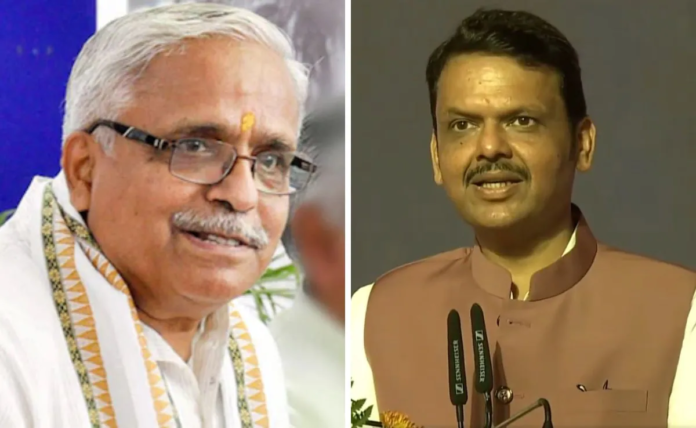Mumbai’s politics is once again revolving around language and identity, a debate that resurfaces before every major election. This time, the controversy stems from RSS leader Bhaiyyaji Joshi’s recent remarks, where he said that Mumbai does not have a single language, and people coming to the city don’t necessarily have to learn Marathi.
For politically aware readers, policymakers, and governance analysts tracking electoral strategies, this controversy is crucial in understanding how political parties use identity politics to shape voter perception ahead of elections.
Marathi vs Multiculturalism: A Familiar Political Tool?
Speaking at an event in Vile Parle, Bhaiyyaji Joshi stated that Mumbai is a city of many languages, citing examples of Gujarati speakers in Ghatkopar and Marathi speakers in Girgaon. He added that outsiders do not need to learn Marathi—a statement that instantly triggered a political backlash.
In Maharashtra’s politics, Marathi isn’t just a language—it’s a symbol of regional pride and political legitimacy. This is why opposition parties, including Shiv Sena (UBT), NCP (SP), and Congress, quickly seized on Joshi’s remarks, demanding an official response from the BJP-led Mahayuti government.
“Is this the official stand of the government? Does Deputy CM Devendra Fadnavis endorse Bhaiyyaji Joshi’s statement?” questioned Shiv Sena (UBT) leader Sanjay Raut.
NCP (SP) MLA Rohit Pawar took it further, saying:
“Mumbai’s language is Marathi. The Mahayuti government must clarify its position immediately.”
In the Maharashtra Assembly, Shiv Sena (UBT) MLA Bhaskar Jadhav demanded a clear explanation from the ruling government.
For policy analysts and political journalists, this reflects how language continues to be a potent electoral strategy in Maharashtra.
Political Damage Control: Fadnavis Responds, Joshi Backtracks
With tensions rising, Deputy CM Devendra Fadnavis was forced to step in, reassuring voters that Marathi remains the dominant language of Mumbai and Maharashtra.
“We respect all languages, but in Maharashtra, there is no compromise on Marathi. Everyone living here should know and learn it,” Fadnavis stated.
Sensing the growing backlash, Bhaiyyaji Joshi issued a video statement clarifying his remarks.
“There is no question of Marathi not being Mumbai’s language. My mother tongue is Marathi, and I respect all languages. People who come to Mumbai should learn and understand Marathi,” he said.
For journalists tracking political narratives, the question remains—was Joshi’s statement an individual opinion, or does it reflect a deeper shift within BJP and RSS towards appeasing Mumbai’s growing Hindi-speaking voter base?
The Changing Linguistic Identity of Mumbai: What the Numbers Say
Beyond political statements, Census data reveals a significant shift in Mumbai’s linguistic demographics:
- Between 2001 and 2011, the number of Marathi speakers in Mumbai declined by 2.64%, dropping from 45.23 lakh to 44.04 lakh.
- In contrast, Hindi speakers surged by 40%, rising from 25.88 lakh to 35.98 lakh.
- Even in Thane and Raigarh—where many Marathi-speaking families moved due to rising real estate costs—Hindi-speaking residents have increased by over 80%.
For policymakers and regional identity analysts, this indicates a demographic shift that could reshape political narratives in Mumbai.
Is the Marathi language truly under threat, or is this just political fear-mongering?
The Politics of Language: Who Gains from This Debate?
Let’s analyze how this controversy benefits different political players:
- For Shiv Sena (UBT), NCP (SP), and Congress: This is a perfect issue to portray BJP and RSS as ‘anti-Marathi’, mobilizing their core voter base ahead of elections.
- For BJP and RSS: By projecting an inclusive stance on Mumbai’s linguistic diversity, they may be attempting to consolidate Hindi-speaking voters, especially North Indian migrants who play a crucial role in Mumbai’s electoral map.
For political enthusiasts tracking voter sentiment, this controversy highlights a strategic balancing act—retaining Marathi pride while appealing to Mumbai’s multicultural reality.
Larger Implications: The Road to 2026 Elections
For NRIs monitoring Indian politics, business professionals assessing regional stability, and policymakers analyzing governance trends, this linguistic debate has far-reaching implications.
- Will Marathi’s decline in Mumbai impact electoral outcomes?
- Can BJP maintain its Marathi voter base while courting Hindi-speaking communities?
- Is Shiv Sena (UBT) successfully reclaiming its Marathi identity after splitting from BJP?
As Mumbai’s political and linguistic landscape evolves, expect more such controversies to surface in the run-up to the 2026 Maharashtra Assembly elections.
👉 What’s your take? Is Bhaiyyaji Joshi’s remark being misinterpreted, or does it signal a shift in Mumbai’s linguistic identity? Share your views in the comments!








